Dissident Director Allegedly Killed by Iran’s Security Forces in Custody

Dissident director and screenwriter Bahare Lelahi was allegedly killed by Iran’s security forces and buried in secret.
Iran International

Dissident director and screenwriter Bahare Lelahi was allegedly killed by Iran’s security forces and buried in secret.
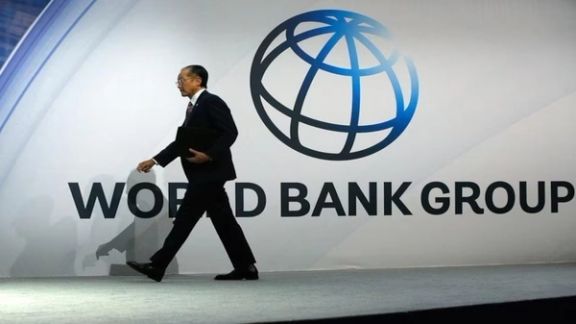
After relatively strong GDP growth in 2023, Iran's economic growth would decelerate in the current and next two years, World Bank reported Wednesday.
According to the report, Iran's GDP experienced a 5% growth in 2023, but it would slow down to 3.2% in the current year, 2.7% and 2.3% in next two years.
The relatively strong economic growth was related to Iran's oil export boom as well as the service sector.
According to OPEC's statistics, Iran's oil production surpassed 3 million barrels per day in 2023, 22% more than the previous year. The production level reached 3.2 mb/d in March and hasn't increased more.
Before US sanctions imposed in 2018 and expanded in 2019, Iran’s crude oil output was above 3.8 mb/d in 2017. It declined to below 2 mb/d in 2020, but since Joe Biden took office at While House, Iran’s oil production began to increase. This was the result of more crude exports to China that had dwindled to less than 200,000 barrels p/d during the Trump administration.
Kpler’s, an industry analyst, has issued figures showing that Iran’s oil exports increased from 350,000 b/d in 2020 to about 1.5 mb/d in the first half of 2024.
Despite the rapid growth, Iran's petrodollar revenues have not kept pace with the increase in oil export volume due to the heavy costs of US sanctions. Not only Iran has to offer China discounts, but also the illicit transfer of oil incurs more expenses.
According to Iran's customs statistics, the country's crude oil and mazut export revenues increased by only 7% last year, reaching $36 billion. Under normal conditions, given the export volume and oil prices, revenues would have exceeded $44 billion.
Iran offers at least $13/barrel discount for Chinese refineries, according to Reuters.
Iran's Statistical Center's reports show the country's 5% GDP growth in the last year was related to 22% oil production growth as well as 17% growth in government expenditures (compared to 2011 base-year).
World Bank says GDP growth is projected to moderate in the Islamic Republic of Iran for the three fiscal years beginning in FY2024/25, while uncertainty around the outlook is elevated: "The moderation partly reflects subdued global demand, the ongoing effects of international sanctions, and domestic energy shortages."
Iran faces a severe electricity deficit in summers and a huge amount of gas deficit in winters. The government put a limit to supply energy to industrial sector to compensate for the housing energy demand.
The industrial sector loses about $6-8 billion annually due to energy deficit.
Previously, the International Monetary Fund also estimated that Iran's GDP would decelerate continuously between 2024-2026.
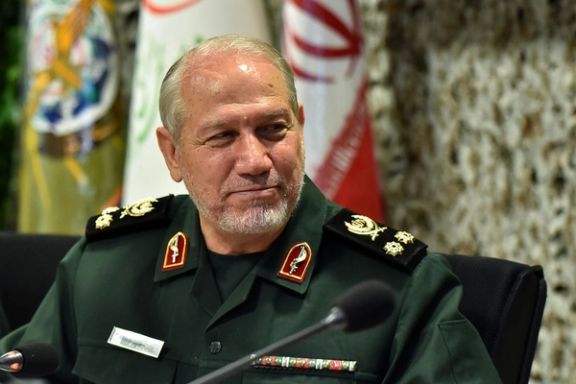
General Yahya Rahim Safavi, the top military advisor to Iran’s Supreme Leader Ali Khamenei, has declared that Iran's next president must align closely with the Supreme Leader's directives.
Speaking to state media, Safavi emphasized that the ideal candidate must view himself as "the second-in-command" to Khamenei, warning against any divergence between the executive actions and Khamenei's vision.
"People should elect a president whose views do not conflict with those of the Leader of the Revolution and who considers himself the second-in-command."
The statement comes in the wake of former President Ebrahim Raisi's sudden death in a helicopter crash on May 19, which has precipitated a snap election scheduled for June 28.
The Guardian Council, which answers to Khamenei, has disqualified a significant majority of hopefuls, permitting only six to run, five of whom are staunch loyalists to Khamenei. The sole moderate reformist cleared to contest, Masoud Pezeshkian, a current parliament member, has notably swayed public sentiment by pledging unwavering loyalty to Khamenei during his campaign, much to the disappointment of reformist supporters.
Safavi's remarks mirror the broader strategy of Iran's leadership to consolidate power around a singular ideological line, especially as the country faces escalating domestic discontent and international pressures. His tenure as the former chief of the Revolutionary Guards further bolsters the weight of his statements, highlighting the military's integral role in shaping and securing the country’s political landscape.
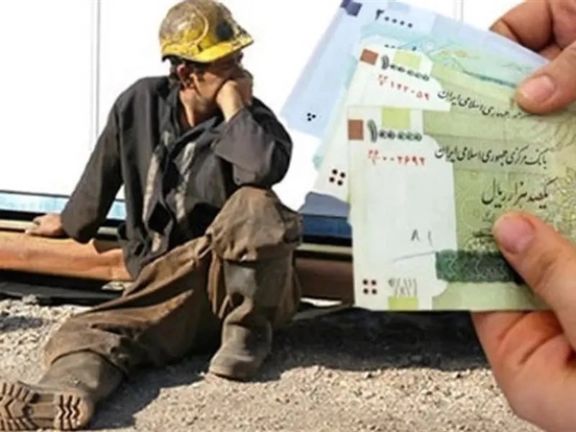
The economic landscape for workers in Tehran is marked by severe hardship, with annual inflation hovering above 40% for five years while wages have only risen marginally.
As reported by the Tehran-based Fararu website, job listings for average workers in the city offer salaries ranging from a meager $116 (70 million rials) to $300 (180 million rials) for a grueling 12-hour workday. These figures highlight the harsh economic conditions faced by Iranian workers, reflecting the broader economic crisis gripping the country.
The Struggle with Minimum Wage
In March of this year, the Iranian government announced a 35% increase in the basic minimum wage, raising it to 110 million rials (approximately $186) with benefits. Despite this increment, the new minimum wage remains woefully insufficient, covering only almost half of the monthly $400 that the average household of three requires for basic food and necessities in Tehran. This shortfall is emblematic of the severe economic pressures on Iranian families, who must navigate a landscape of rampant inflation and currency devaluation.
Inflation and Currency Devaluation
Iran is grappling with an inflation rate of around 50%, and the national currency, the rial, has depreciated 15-fold since 2018, reaching historic lows. This dramatic devaluation has fueled widespread inflation, exacerbating poverty across the nation. The discrepancy between wages and the cost of living is stark, with many workers unable to afford basic necessities despite working long hours. This economic disparity further deepens the financial strain on millions of Iranians, pushing many to the brink of poverty.
Job Listings and Salaries: A Grim Reality
- Supermarkets and Shops
Job listings analyzed by Fararu reveal a grim picture of wages and working conditions in Tehran. Supermarket and shop workers face some of the harshest conditions. One advertiser offered between 90 million rials ($150) and 100 million rials ($169) per month for a full-time supermarket worker role from 8:00 AM to 8:00 PM, without insurance. Another shop in Farmanieh, a wealthy district in northern Greater Tehran, offered slightly better wages, ranging from 120 million rials ($200) to 150 million rials ($250) for similar work. Shelf stackers in supermarkets earn around 130 million rials ($215) and may receive additional benefits such as meals and a place to sleep.
- Fast Food and Restaurants
Fast food workers in the Olympic Village in District 22 earn between 70 million rials ($116) and 90 million rials ($150) for a 12-hour shift, from 11:00 AM to 11:00 PM. These positions often include meals and accommodation but lack insurance. Restaurant workers in areas like Javadiyeh in the South of Tehran face even longer hours, working from 9:00 AM to 11:00 PM, totaling 14 hours a day, with similar pay. These roles typically require a year of experience and may or may not include insurance, further complicating the workers' financial stability.
- Cleaning and Dishwashing Jobs
Workers in cleaning and dishwashing roles also endure difficult conditions. Motorcycle cleaning workers are offered 90 million rials ($150) to 150 million rials ($250), with meals and accommodation provided. They work seven days a week, including half days on Fridays, which is the official weekend. Dishwashers in Yousef Abad, in the north-central part of Tehran, earn about 110 million rials ($183), with shifts from 8:00 AM to 10:00 PM.
High-Salary Advertisements: Reality or Deception?
Some job advertisements boast salaries as high as 400 million rials ($680). However, these figures often come with significant conditions or when contacted by Fararu the advertiser cited a mistake in the advertisement. For instance, an auto parts company worker lists salaries ranging from 220 million rials ($370) to 350 million rials ($595), but the actual starting salary is 135 million rials ($230) when Fararu made inquiries with the advertiser. These higher figures are typically for more experienced or specialized roles and involve substantial overtime.
Similarly, an advertisement for electricians in Tehran Pars offers up to 25 million rials ($420). Yet again when inquiries were made by Fararu, the advertiser stated that the actual starting pay is 90 million rials ($150) and the salary only reaches higher levels after a probationary period and training.
The economic crisis in Iran, marked by high inflation and currency devaluation, has created an environment where workers in Tehran face significant financial challenges. The reported wages are insufficient to meet the basic needs of workers and their families, leading to widespread poverty, and underscoring the broader economic challenges facing the country.
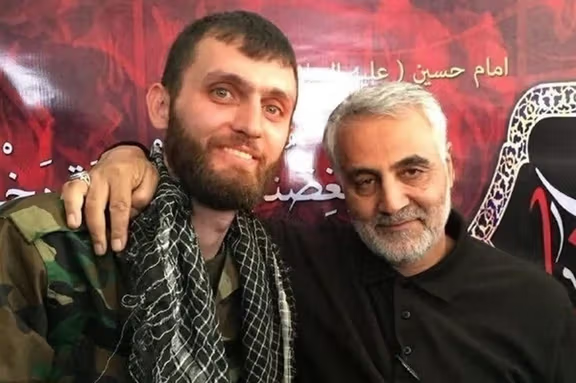
Iran says Iraq has rejected US request to extradite Mohammadreza Nouri, a Revolutionary Guard officer who has been sentenced to life imprisonment for the murder of an American in Iraq.
Kazem Gharibabadi, the deputy of Iran's Judiciary for International Affairs denied the allegations against Nouri on Monday, describing the member of IRGC’s extraterritorial Quds Force as "defender of the shrine."
The Islamic Republic refers to its forces sent to Syria as defenders of the shrine of Zeynab, the sister of the third Shiite Imam. Nouri also holds Syrian citizenship , where he was known by his nom de guerre "Abu Abbas."
According to Iran International's sources, after the war in Syria, Nouri went to Iraq, where he used his connections to secure commercial contracts for companies affiliated with the IRGC. Nouri, along with a member of the Iraqi Harakat Hezbollah al-Nujaba militant group, pressured businesses into cooperation with the IRGC, threatening them that if they did not sign contracts, they would face repercussions from Nujaba. According to information obtained by Iran International, Nouri, was previously arrested in Iran on charges of espionage. Our sources did not provide further details about his prior conviction in Iran.
Gharibabadi claimed that Washington had requested his extradition, but Baghdad rejected it. Although the Islamic Republic and the Iraqi government have signed an extradition treaty, Iraq has so far also refused to transfer Nouri to Iran.
"Through legal and judicial efforts, the charges against Mohammadreza Nouri changed from terrorism-related offenses to other charges, creating the legal basis for his transfer to Iran," Gharibabadi said.
Nouri was arrested along with four Iraqi nationals for killing American national Stephen Troell in Baghdad. The five were sentenced to life in prison in September 2023. Nouri’s identity had not been released to the media at the time.
Troell, an English teacher, was shot dead by at least two gunmen while driving through Baghdad’s Karrada district in November 2022. According to a source cited by Reuters, the murder was orchestrated by Nouri, along with his Iraqi accomplices. Troell, a 45-year-old Tennessee native, worked at the Global English Institute, a school managed by his wife, Jocelyn. They had lived in Iraq’s capital along with their three daughters and a toddler son.

“It is critical that all those responsible for the brutal, premeditated assassination of Mr. Troell face justice and accountability,” said State Department spokesperson Matthew Miller in a statement after the verdict was issued. “We welcome the Iraqi court’s decision to convict and sentence multiple individuals on terrorism charges for their roles in the killing of US citizen Stephen Troell.”
Citing a judicial source, AFP said that the five confessed to the murder, noting that they had intended to kidnap Troell for ransom. Karrada was also the site of the kidnapping of Elizabeth Tsurkov, an Israeli-Russian abducted by Iran-backed militant group Kata'ib Hezbollah last June. Tsurkov was a graduate student at Princeton University conducting research in Iraq.
According to Al Arabiya, a militant group called Ashab al-Kahf, (Companions of the Cave) claimed responsibility for Troell’s assassination, saying that it was a retaliation for the targeted killing of IRGC-Quds Force commander Qasem Soleimani and Abu Mahdi al-Muhandis, the commander of Iraq’s Popular Mobilization Forces (PMF), by the United States in 2020.
Nouri’s case made news in Iran in May, when late Foreign Minister Hossein Amir-Abdollahian met with his wife and father, emphasizing that efforts are underway for his release.
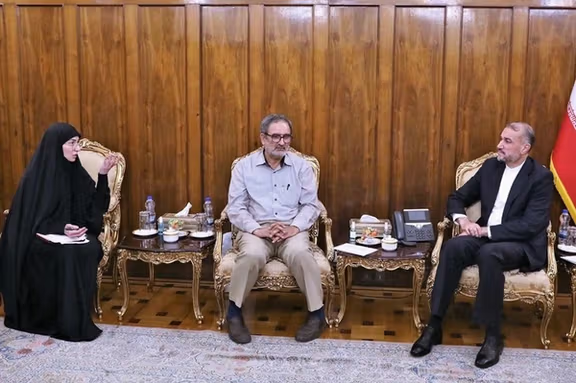
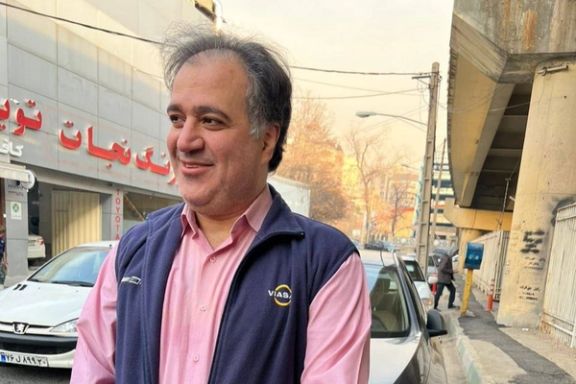
Former political prisoner Mehdi Mahmoudian has disclosed he is facing two charges, one regarding his comments about the Baha'i minority in Iran and the other for an infestation of bedbugs in Evin Prison in Tehran.
The activist revealed that Behesht Zahra Cemetery, administered by Tehran’s municipal authorities, has lodged a formal complaint against him for the comments he made about the Baha’is in Iran, specifically their struggles with burial procedures for their loved ones.
In February, during a political discussion published on Didarnews, an Tehran-based news outlet, the political activist engaged with MP Mehdi Mousavinejad on various issues, including the rights of minorities in Iran.
"How can we discuss equal rights in Iran?" A large number of Iranians--between 100,000 and 400,000--were denied official birth certificates for years. They were unable to register their marriage. They couldn't book a hotel with their spouses despite having children," Mahmoudian said.
"Presently, they are deprived of the basic right to bury their kin. We have citizens who, for centuries, inhabited Iran, yet they are barred from laying their families to rest. The Bahá'í community is unable to inter their loved ones in the lands rightfully theirs, which they have acquired through rightful purchase.
“Instead, authorities retain the deceased for a span of 10 to 20 days before clandestinely conducting burials. Their autonomy in choosing the final resting place is severely restricted," Mahmoudian explained.
Unofficial estimates suggest that Iran is home to over 300,000 Baha'i adherents. According to Amnesty International, Baha’is are Iran’s largest non-Muslim religious minority.
However, their rights are violated in a vast and systematic manner, including “arbitrary detention, torture and other ill-treatment, enforced disappearance, forcible closure of businesses, confiscation of property, house demolitions, destruction of cemeteries, and hate speech by officials and state media, and are banned from higher education,” according to Amnesty.
Mahmoudian, who has been arrested more than eleven times and has spent eight years in prison for political activities, posted on X in May that Taleghani Hospital in Tehran had declared it would no longer accept dialysis patients from Evin Prison due to bedbug contamination.
According to the activist, the hospital provided a sample canister of bedbugs to Evin's head of the medical department to support the claim.
Previously, Zia Nabavi, a student activist and political detainee, detailed the severe conditions caused by the infestation, including sleep deprivation; he was later moved to solitary confinement.
A source close to her family informed Iran International that security forces demanded money to disclose her burial location and ordered them to keep her death private.
While the exact circumstances surrounding her death remain unclear, human rights activists believe it is a state-backed killing based on the actions of state agents, such as the cover-up and secret burial.
Lelahi, 40, who was briefly detained during the 2022 nationwide protest, went missing in March 2023. In September 2022, the death in police custody of Mahsa Amini, which the UN’s fact-finding mission pinned on state authorities, ignited nationwide demonstrations, during which more than 550 protesters were killed.
Dissident journalist Masih Alinejad wrote on Instagram: “After extensive inquiries, her family was informed through the police that Lelahi had died and was interred at Bibi Sakineh Cemetery in Karaj, near Tehran.
“Despite having killed Bahareh and inscribing her name on the burial site, authorities withheld this information from her family for three months.”
The online Institute for Iranian Civil Society (Tavaana) also cited sources close to her family claiming they are trying to bring her body back to their hometown of Amol, in northern Iran, to bury her.
Tavaana also reported that security forces are summoning citizens via phone. When individuals comply without informing anyone, they can be held with no legal representation and nobody has knowledge of their whereabouts.
Amnesty International has highlighted the Iranian authorities have failed to provide accountability for tens of deaths in custody, despite credible reports that they resulted from torture or other ill-treatment or the lethal use of firearms and tear gas by officials when rounding up protestors.
Judiciary officials, who have consistently denied international investigations into Iranian prisons and detention centers, assert that conditions in these facilities are adequate. However, the experiences of numerous prisoners shared by rights groups reveal that prisons and detention centers operated by security forces have effectively become "killing grounds," particularly for dissidents.